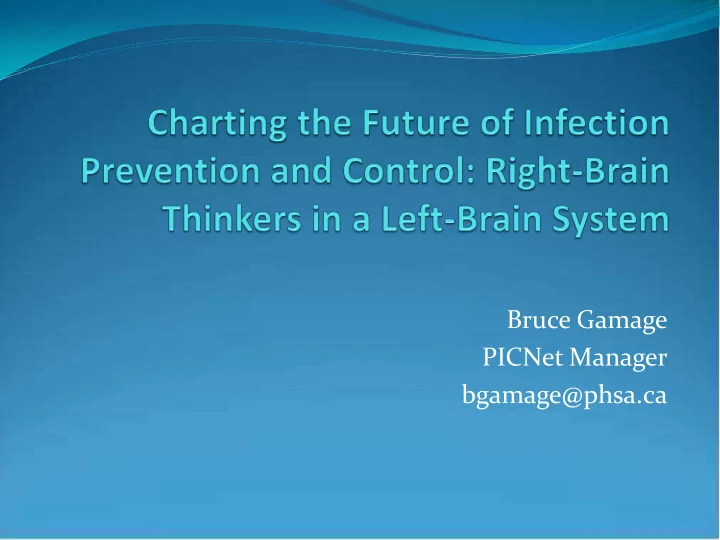

Bruce Gamage PICNet Manager bgamage@phsa.ca
Objective Explore new ways of approaching Infection Prevention and Control in the ever changing environment that we work in… How can we apply right-brain thinking in a left-brain system?
Classical Right/Left Brain
Classical Right/Left Brain
BANG HEAD HERE
Six Aptitudes of Right-Brain Thinking -Dan Pink
Designing our Future Most hospitals are not repositories for design and good taste Function takes precedence over design Design should not be an afterthought Patients in better designed units require less pain medication and are discharged sooner How could we design hospitals with better infection control in mind?
Telling a Story Medical systems tend to ignore the patient’s story – they become their “diagnosis” Anecdotes are considered the lowest form of science Scientific medicine alone cannot help the patient grapple with their loss of health or find meaning for their suffering Need to listen to the patient’s narrative to grasp and honour what the illness means to them and act on their behalf How can we use the patient’s stories to improve infection control practice?
See the Symphony Seeing the big picture Allows leaders to pick out meaningful trends from the mass of information and think strategically into the future How can we apply “big picture” thinking to improve infection control practice
Applying Empathy Need to pay attention to the feelings that the patient is expressing Nurse’s empathetic skills contribute to healing – touch, presence and comfort Sometimes we need detachment – but we also need attunement How can we apply empathy to improving infection control practice?
Play The opposite of play isn't work - It's depression. Laughter is a form of nonverbal communication that conveys empathy and that is even more contagious than a yawn How can we incorporate some fun into our education and still get our message across?
Finding Meaning Do Physicians take spiritual histories from patients? Do we explore what the illness means to the patients? Do we attach a meaning to the data we collect – or is it just numbers? A story…
A teenager with C. diff 15 year old girl Grade 10 at high school Intermittent super pubic pain X 6 months Outpatient cystoscopy , 10 day course of antibiotics 2 weeks later developed severe diarrhea Her mother didn’t find out until she passed out at school No information was given, no education provided Nobody explored what this meant to her
Moving Forward… What can we learn? How can we apply this to our practice? Is what we are doing making a difference? How can we do better? Keep asking questions!
Suggested Reading A Whole New Mind: Why Right-Brainers will Rule the Future (Dan Pink) http://www.danpink.com/whole-new-mind Change your questions, change your life (Merilee Adams) http://inquiryinstitute.com/
Recommend
More recommend